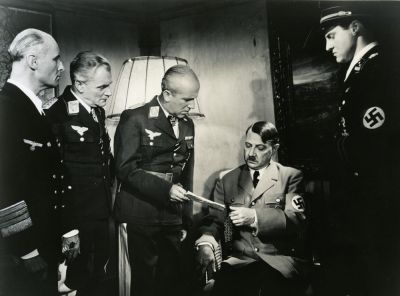
THE MAGIC FACE
(La grande vendetta, USA/1951)
R.: Frank Tuttle. D.: 88'. V. inglese
T. it.: La grande vendetta. Scen.: Mort Briskin, Robert Smith. F.: Tony Braun. M.: Henrietta Brunsch. Scgf.: Edward Stolba. Mus.: Herschel Burke Gilbert. Int.: Luther Adler (Janus il Grande/[Karl] Vogel), Patricia Knight (Vera Janus), William L. Shirer (se stesso), Ilka Windish (Carla Harbach), Heinz Moog (Hans Harbach), Peter Preses (Warden), Manfred Inger (Heinrich Wagner), Jasper Von Oertzen (maggiore Weinrich), Charles Koenig (Franz), Toni Mitterwurzer (Hans), Annie Maiers (Mariana). Prod.: Mort Briskin, Robert Smith per Columbia Pictures Corp.
35mm. D.: 88'. Bn. Versione inglese / English version
Da: BFI - National Film Archive
Che si tratti della spettacolarità di Norimberga o dei processi di Mosca, l'elemento scenico assume un'importanza primaria: esso detta non solo le forme della storia, ma la storia stessa. Basti aggiungere che tutti i dittatori dell'epoca erano appassionati di cinema. Per questo motivo The Magic Face non è solo uno sfoggio di talento attoriale, ma qualcosa che incarna l'essenza della sua epoca, collocando l'attore (come fece Lubitsch nel brillante Vogliamo vivere!) al centro della politica mondiale.
Il protagonista Karl o 'Janus il Grande' è interpretato da Luther Adler, famoso attore teatrale e volto noto del grande schermo (e fratello di Stella Adler), qui in una delle sue migliori prove. Il primo assaggio è la sua imitazione dei notabili del tempo: Mussolini, Hailé Selassié e Chamberlain. Un giorno si reca al suo spettacolo un personaggio ancora più celebre, Hitler in persona, che con un semplice gesto ordina alla moglie di Adler di seguirlo. La seduzione (gesto inusuale per Hitler, il cui ricco repertorio di vizi non comprendeva la lascivia) non resta impunita. Il brillante imitatore cerca di opporsi alla situazione, ma viene arrestato. Grazie al suo talento evade travestendosi da guardiano, poi impersona un ufficiale nazista e riesce infine a diventare cameriere personale di Hitler.
Il dittatore vero beve un bicchiere di latte avvelenato e il suo cadavere viene bruciato, mentre la moglie di Luther, Vera (nella quale possiamo ravvisare somiglianze con Eva Braun), si ritrova nuovamente di fronte al marito che ha assunto le sembianze di Hitler (quasi a rispecchiare la Hollywood dell'epoca, con gli attori immigrati antifascisti che interpretavano i ruoli dei peggiori criminali nazisti).
The Magic Face si apre con il grande giornalista William L. Shirer che in mezzo alle rovine davanti al bunker di Hitler ci racconta con fare impassibile una storia inventata. È la persona giusta per farlo, dato che in questo caso la realtà era più improbabile della finzione. Il film appartiene a un'interessante minoranza dell'estesa produzione di Frank Tuttle (il cui film migliore potrebbe essere considerato il noir This Gun for Hire); il regista era un membro del partito comunista fin dagli anni Trenta, e quando girò The Magic Face era in difficoltà a causa delle liste nere. Il film era sceneggiato da Robert Smith e Mort Briskin, che ne erano anche i produttori.
Peter von Bagh
Whether a Nuremberg pageantry or Moscow trials, there was a supreme stagecraft that dictated not only the forms of history but history itself. Needs to be added only that all the dictators of the age were enthusiastic about movies. Thus The Magic Face is not only good showmanship but something from the essence of its times, placing actor (like Lubitsch did in his brilliant To Be or Not to Be) into the center of world politics. The protagonist Karl or 'Janus the Great' is played by Luther Adler, a famous theatre actor (and brother of Stella Adler) and well-know screen presence who has seldom been better. The starter is his impersonation of the notables of the times: Mussolini, Haile Selassie, Chamberlain. The show is visited by an even greater name, Hitler himself, who in a simple gesture orders the wife of Adler to follow him. The seduction (an untypical gesture for Hitler whose rich repertory of vices did not include bawdiness) does not go unpunished: Hitler gets a malicious shadow who happens to be brilliant imitator.
Karl/Adler is arrested but escapes from prison, again helped by his acting talents; and then the role of nazi officer which gives him a clue to proceed higher. Which succeeds, and we have him as Hitler's valet.
The estranged wife of Luther, Vera - we might see characteristics of Eva Braun in her - has to face the final surprise of her life, as she experiences the sight of her husband - under the mask of Hitler (as almost an image of Hollywood then: with the antifascist emigrant actors usually playing the roles of the worst Nazis). The dictator himself sips a poisonous glass of milk and will be burnt at the court.
The Magic Face starts with the great reporter William L. Shirer talking to us, in the midst of ruins and in the front of Hitler's bunker. He presents in blank face an unbelievable fiction, and is exactly the right person to do so. When else was reality anyway so much more improbable than any fiction? The film belongs to the interesting minority of Frank Tuttle's (whose finest film might be the tough noir This Gun for Hire) large output; he was a party member since the 1930s, and in difficulties with the blacklist at the time of the making of The Magic Face. The film was written by Robert Smith and Mort Briskin, two independent producers behind the film.
Peter von Bagh
Tariffe:

Numero posti: 144
Aria condizionata
Accesso e servizi per disabili
Il nostro cinema aderisce al circuito CinemAmico: è possibile utilizzare l’applicazione MovieReading® per i film di cui è prevista audiodescrizione e/o sottotitolazione sull'applicazione.
Tel. 0512195311











